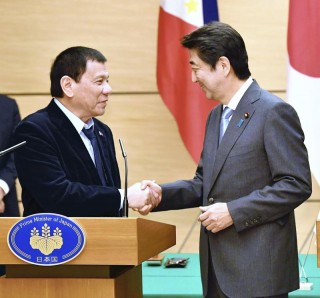Loading
Search
▼ Abe, Duterte Reaffirm ‘Rule of Law’ in South China Sea
- Category:Other
Prime Minister Shinzo Abe held talks in Tokyo with visiting Philippine President Rodrigo Duterte on Wednesday, during which they confirmed their commitment to the rule of law and freedom of navigation in the South China Sea, after an arbitration court rejected in July Beijing’s claims in the area.
“I hope to make Japan-Philippine relations even more solid and develop them significantly,” Abe told Duterte at the opening of their meeting.
The Philippine president said he hopes to resolve issues related to the South China Sea peacefully under the rule of law and based on the U.N.
Convention on the Law of the Sea. Abe reiterated Japan’s readiness to help the Philippines improve its maritime security capabilities by providing Japanese patrol vessels and taking other measures.
The leaders are also believed to have agreed to strengthen economic ties between their countries.
In addition to his finance, trade and other economy-related ministers, Duterte is also accompanied by about 200 businesspeople on his first visit to Japan since assuming the presidency. By attracting more investment and economic support from Japan, he aims to further boost his country’s economy, which is already achieving high annual growth of 6 percent on average.
Duterte’s predecessor, Benigno Aquino, promoted economic ties with Japan and agreed to cooperate on large-scale projects including building railway networks. The Japanese government intends to maintain such ties and strengthen them with the new Philippine administration, and to prioritize assistance to the southern Philippine island of Mindanao, Duterte’s home area.
The Japanese government’s willingness to offer economic assistance to the Southeast Asian nation comes against the backdrop of China’s aggressive maritime advances in the South China Sea, among other issues.
During the talks, Abe was expected to explain the United States’ role in security in the Asia-Pacific region, as Duterte has repeatedly criticized the U.S. The prime minister was also expected to call for the three countries to maintain cooperation.
“I hope to make Japan-Philippine relations even more solid and develop them significantly,” Abe told Duterte at the opening of their meeting.
The Philippine president said he hopes to resolve issues related to the South China Sea peacefully under the rule of law and based on the U.N.
Convention on the Law of the Sea. Abe reiterated Japan’s readiness to help the Philippines improve its maritime security capabilities by providing Japanese patrol vessels and taking other measures.
The leaders are also believed to have agreed to strengthen economic ties between their countries.
In addition to his finance, trade and other economy-related ministers, Duterte is also accompanied by about 200 businesspeople on his first visit to Japan since assuming the presidency. By attracting more investment and economic support from Japan, he aims to further boost his country’s economy, which is already achieving high annual growth of 6 percent on average.
Duterte’s predecessor, Benigno Aquino, promoted economic ties with Japan and agreed to cooperate on large-scale projects including building railway networks. The Japanese government intends to maintain such ties and strengthen them with the new Philippine administration, and to prioritize assistance to the southern Philippine island of Mindanao, Duterte’s home area.
The Japanese government’s willingness to offer economic assistance to the Southeast Asian nation comes against the backdrop of China’s aggressive maritime advances in the South China Sea, among other issues.
During the talks, Abe was expected to explain the United States’ role in security in the Asia-Pacific region, as Duterte has repeatedly criticized the U.S. The prime minister was also expected to call for the three countries to maintain cooperation.
- October 28, 2016
- Comment (0)
- Trackback(0)


